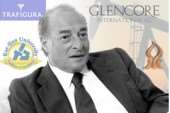 In printing or posting their reactions to the death of Marc Rich June 26th, news sources gave great play to the most politically contentious fact of his extraordinary life: the pardon extended him by U.S. President William Jefferson Clinton as Clinton was on his way out the White House door, and the (reasonable) speculation that this pardon was a quid pro quo after Denise Rich, Marc’s ex-wife, had made generous contributions to the Democratic Party and the Clinton Library foundation.
In printing or posting their reactions to the death of Marc Rich June 26th, news sources gave great play to the most politically contentious fact of his extraordinary life: the pardon extended him by U.S. President William Jefferson Clinton as Clinton was on his way out the White House door, and the (reasonable) speculation that this pardon was a quid pro quo after Denise Rich, Marc’s ex-wife, had made generous contributions to the Democratic Party and the Clinton Library foundation.
Yes, the speculation is reasonable and it’s a good story to hang an obit on. But there are other, even better, stories in Marc Rich’s long life, such as those that inspired a 2009 biography, The King of Oil, by Swiss journalist Daniel Ammann.
Recalling the mid-1970s
In 1974, Rich founded a commodity firm with Pincus Green and Alec Hackel. Green was also an eventual recipient of that January 2001 presidential pardon and is still amongst us.
The financial world was changing rapidly when these men created Rich + Co. President Nixon had closed the gold window four years before, creating a world in which currencies float against one another untethered to any commodity. Institutions, including the nation-states, were struggling to come to grips with what that meant. Even more dramatically, during the Yom Kippur War in 1973 the OPEC nations had imposed an oil embargo against the United States and other nations overly friendly to Israel, and reduced oil production by 5% a month.
The big oil companies, the “seven sisters” as they were called at the time, were caught flat-footed by OPEC’s moves. Until circa 1974 their business model, in somewhat idealized form, had been a vertical one – they had aspired for decades to control the flow of oil from the wellhead through the refinery to the roadside pump. But in a crisis, the neat vertical lines break up, and something more zig-zag is required. Rich was outside of the establishment, yet he had the connections he needed to make the zig and zag work.
With their neat vertical lines interrupted, the Seven Sisters had to buy oil from this new operation. To quote Ammann, “In 1974, the company’s first fiscal year, it had a turnover of more than $1 billion while reaping a net profit of $28 million. The company’s profit in 1975 was $50 million, and it went on to earn what was then an unbelievable $200 million in 1976.”
Thus: a spot market for crude oil was born.
The Fall of The Shah: and Others
One of the connections that made it possible for Rich to fulfill this role was his relationship with the government of Iran under the House of Pahlavi. Company co-founder Green spoke Farsi and was the company’s expert in Iranian matters. Through the early years of Rich + Co., the firm was buying 200,000 barrels a day.
They faced an obvious challenge, then, when Iran erupted in revolution in 1978-79. Their best contacts, such as Parviz Mina, the director of the National Iranian Oil Company, and Ali Rezai, a Senator and industrialist, had to leave the country like their Shah himself.
It was Rich’s response to that crisis that led in the end to his downfall, his long exile, and that infamous pardon. The new regime would take American hostages even as Marc Rich + Co. was working to develop new contacts in Iran, contacts that would preserve Iran as a source of supply for the spot market.
The tax charges for which Clinton eventually pardoned Rich were themselves initially piggy-backed on a trading-with-the-enemy charge, and that came out of Rich’s Iranian connection.
Judge Rich himself as you think best, he is now beyond the reach of all human judgment forever. The creation of the spot market was a step toward a healthier, more sustainable, world oil industry and for this Rich deserves some gratitude.
Rest in peace.



